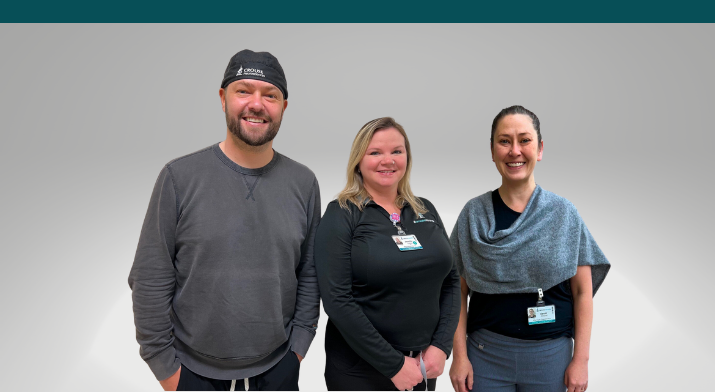Stroke Care: Beyond the Hospital
By: Laurie Clark
October 26, 2023
Home » Crouse Connects » Stroke Care: Beyond the Hospital
 When a patient comes to Crouse because they are having a stroke, they’re in the capable care of our dual-certified Comprehensive Stroke Center and multidisciplinary team working in our two hybrid operating room suites to provide the most advanced stroke rescue capabilities.
When a patient comes to Crouse because they are having a stroke, they’re in the capable care of our dual-certified Comprehensive Stroke Center and multidisciplinary team working in our two hybrid operating room suites to provide the most advanced stroke rescue capabilities.
But what happens next can differ for every patient. Some stroke patients may have a longer stay in our Intensive Care Unit (ICU), some may move to our floor units. Many patients need physical and occupational therapy, which they may continue when they leave the hospital. Some patients may need long-term care in a rehabilitation facility. Many patients have family and friends who can assist with care, but some do not.
Just as each patient is different, so is their treatment plan, both while they’re patients at Crouse and when they return home.
Seeing the need for more assistance for patients and their families to understand what comes next, the Crouse Neuroscience team created Transitional Care and Chronic Care registered nurse positions to better equip patients and their families for life after a stroke.
Bridging the Gap for Patients
“No one is planning for a stroke,” says Jameson Crumb, PA-C, clinical director for the Crouse Neuroscience Institute. “There can be a lot of shock and confusion and with that comes a lot of questions. We’re trying to fill the gaps for the patients while also preventing re-admissions or ER visits.”
Jennifer Gibson, RN, is in the transitional care role. When applicable, Jennifer meets with patients while they are still in the hospital and makes sure they understand their treatment plan and medication schedules. She also reviews all of a patient’s documents and provider notes and communicates with the providers to be sure the treatment plan is accurate and according to the provider’s exact instructions.
“They are receiving a lot of information so it’s important for me to go over the medication schedules so they understand what they’re taking and when. I add specific dates and times for them to eliminate confusion. If they are being discharged, I make sure their medications have been ordered and they have any referrals they may need,” Jennifer says.
Jennifer said she will also go over instructions and answer any questions from loved ones, which sometimes involves setting up video calls between families and providers.
Chronic Care
For some patients, once they are discharged from hospital care, Sarah Driscoll, RN, steps in to provide chronic care follow-up.
“Our goal is to get patients back to health. We know that stroke patients are at risk for reoccurrence so we want to help patients limit their risks and provide education on signs and symptoms,” Sarah says. She typically works with about 160 patients every month.
Sarah and Jennifer work collaboratively to help patients coordinate their follow-up appointments with primary care physicians, specialty care physicians, physical therapy and make sure they understand their medications.
Benefitting from Chronic Care
For patients Jane Neal and Charles Usherwood, having Sarah to coordinate with primary and specialty care physicians was especially helpful.
Jane and Charles, 86 and 89 respectively, have been together for 10 years and were able to care for one another independently. But then Charles began to have issues with balance and walking. He saw David Padalino, MD, from the Crouse Neuroscience team, for a shunt. Shortly after, Jane suffered an ocular stroke and began seeing Collin Maloney, PA-C.
“I was just home from my first appointment with Collin when Sarah called me,” Jane says. “I’m seeing more doctors now than I ever have in my life and Sarah has helped me coordinate these appointments and make sure they all get my records.”
Jane and Charles both still speak with Sarah; Jane says she calls to check in on them often.
Now, Jane says, they are both doing better than ever.
Survivor Led Support
Sarah also makes patients aware of community resources, like stroke support groups.
One local support group, Triumph Over Stroke, is led by Katie Weiss who suffered a stroke in 2015 at 33 years old. After being treated at Crouse, she was invited to give feedback at a stroke survivor session at the hospital.
“It was eye-opening,” Katie says. “I felt so connected to everyone. I was the youngest there but there were so many people who had recovered so much and others who were still struggling and I was so moved.”
This session generated the idea for a survivor-led group. Katie admits it was slow-going at first but after a few months attendance began picking up. Both survivors and those impacted by stroke – families or caretakers – are invited to attend.
The group meets on the fourth Monday of each month, incorporating Zoom into their meetings since the pandemic, and often features guest speakers from Crouse like Kelly Van Auken from our Physical Rehabilitation team and Crouse neurosurgeons like Dr. Padalino.
The group also is great about sharing information and resources with one another.
Katie recognizes that every stroke survivor faces different struggles but there are commonalities that bring them together.
“Whether you’re two days out from your stroke or two years out, you’ll have struggles. But there is hope—and support,” she says.
Laurie Clark is the Communications and Digital Media Manager at Crouse Health.
Share this
